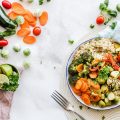One statement you hear a lot (or even most often …) in the context of healthy eating is to “eat everything in moderation”. You can probably tell from my cheeky post title already that I have my concerns with this statement. Please do not get me wrong: I am sure this statement is meant well, and I do not at all want to offend anybody advocating it. But to be honest, telling me to “eat everything in moderation” makes my toe nails roll up (German saying). You could also tell me, “Just be normal!”, for a similar effect. Let me tell you what I think is so problematic about this statement.
(By the way: This is your chance to visit the bathroom or get yourself some tea / coffee / water / wine now, because as always with my just thoughts posts, this is going to be a long one.)
A good starting point is to take the whole phrase apart. Like this: “eat” – “everything” – “in moderation”.
I will begin with the “eat” part. Principally, there is nothing bad about a recommendation that tells you to eat, particularly not when we are talking about healthy eating, but also in general. Not to eat (at all) would be a very bad idea, no? I also do not have a problem that this “eat” comes as an imperative, since we are discussing a recommendation here. So, the “eat” seems to be okay. Moving on.
“Everything” is a little trickier. What exactly is ”everything”??? Well, basically, “everything” can actually be anything – including light bulbs, a chair, your pillow, a brickstone, your left arm … Go figure. But since we are still moving within the context of eating (and context is important to make sense of a statement), I will be nice and limit this “everything” to anything commonly refered to as “food”. This again gets us to the question what “food” is.
~ they look funny, but … umm … seriously?? ~
You may remember that, a while ago, I made a post on what food actually is. In that post, I came to the conclusion that food is nothing per se, but that the meaning of “food” has to be actively constructed. (And there are several, sometimes contradictory notions of the concept of “food” existing in parallel at different levels of perspective, such as the levels of society and individuals.) Depending on how you interpret the term “food”, the recommendation to “eat everything in moderation” has diverging meanings. However, it remains problematic nevertheless.
On the one hand, you may define “food” as everything commonly considered as food. This means, “food” is everything (more or less) edible that does not kill you immediately after swallowing it, and contains a certain amount of calories. In this regard, it makes sense to recommend moderation, in so far as “food” also contains a couple of rather unhealthy things that should indeed be limited (or probably not be consumed at all – but that is another story, since we are talking about moderation here, which allows a little bit of everything). What is problematic here is the “eat everything” part of the recommendation, because literally, this means you should also eat the unhealthy things to some extent (but not too much of them, mind you).
On the other hand, you may define “food” as everything your body can thrive on. This means you narrow the term down to “real food” that serves to nourish your body and fuel you with energy. In this regard, “in moderation” is the problematic part of the recommendation, because why should you be moderate about what your body wants and asks for? This would mean you would deprive it of what it needs, no?
So you see, I have my concerns already. But we are not finished yet. You can assume the most problematic part is still to come … Also note that we have a nice increase of “problematicness” (just made up this word) with the “eat everything in moderation” statement. (Just a sidenote.)
You will have supposed already that the particularly tricky part is the “in moderation” part. Let me say I am not opposed to moderation in general. Moderation is related to balance, and balance is a very nice thing and, as far as I believe, also very important with regard to happiness and well-being: Nothing is good when driven to the excess. But I am also a psychologist, and this is why I am sensible to and aware of the fact that it matters how things are framed. For instance, the same statement can be perceived completely differently, depending on whether it is expressed in a way that encourages you and opens up a range of possibilities to you, or in a way that limits you and the options available.
To my mind, the word “balance” has a positive connotation, because it means something I consider valuable and beneficial to achieve in my life. However, the word “moderation” has a negative connotation, because it reminds me that I have to be careful not to overdo things. In other words, “moderation” (for me) is an euphemism for restriction. It actually is restriction in disguise. This is triggering for me because I am a very easy victim of reactance: I always want what I am not to have. (Do you remember reactance? I have covered that in a post as well, because I find the concept so valuable in understanding human motivation and behavior.)
However, to do justice to the term “moderation”, we have to differentiate it further. Moderation is not bad per se. But there is “active” and “passive” moderation, and this makes a huge difference.
Let me start with the nicer one, which is passive moderation. This means that you do not have to consciously control yourself to be moderate, since your body tells you to be so, somewhat automatically. Believe me (as somebody who did not believe this anymore herself, but miraculously relearned it during the recent 1 1/2 years): The body is capable of regulating its nutritional needs by authentic hunger and satiety. The word “authentic” is very important here, because there probably are certain foods that leave you hungry half an hour after eating them, or make you want more and more, the more you eat of them. But this is not actual hunger, just a blood sugar roller coaster reaction. All foods that actually nourish you will keep you satisfied for a couple of hours after eating them, because they give your body what it needs and do not mess with your blood sugar levels. These foods are, most likely, vegetables, healthy fats, protein sources, and probably whole grains and fruit (if you are not overly carb-sensitive). From these foods, you can eat until you are satisfied, and do not have to waste one thought about moderation. Imagine you just finished off a steak or a big slice of roasted tofu with a generous serving of mixed salad, sprinkled with olive oil and some nuts or seeds. Do you feel like having a second serving of this? Probably not, because the body cannot handle protein to an infinite extend, and the fats coming with a dish of this kind also contribute a lot to satiety, not to mention you are filled up by the veggies.
On the other hand, there are foods that taste good but make you want to eat more of them, so you have to stop yourself before feeling satisfied, applying active moderation. These foods are likely to be of the sugar-overloaded and simple (“white”) carb-heavy kind. Next to the sugar-fat combo that seduces you to eat more, foods of this kind usually do not have a lot of volume, so your belly will not notice it is filled up sufficiently until you have finished off the whole package. If you include things like that into your diet on a regular basis, moderation might in fact be an adequate recommendation, because otherwise you might end up eating nothing else. However, it also means constant vigilance.
~ why not just relax about food? ~
To be honest: I do not believe that it is a good idea to regularly eat things like that in the long run. The reason basically is that I am a lazy girl (I cannot mention that often enough ), and I want to invest my cognitive capacities into something else than pondering whether or not to eat a cookie, given I aready had some chocolate with my breakfast and am probably going to have a little dessert after dinner. I also dislike to feel uncomfortable, so I do not like to stop eating before I feel satisfied, and then struggle through those infamous 20 minutes the body allegedly needs to perceive satiety signals coming from the tummy, while tigering around (another German saying) in the kitchen and piling up food stress. I have done that for many years, and it was enough for this life and all the ones to come.
Instead, I want to really enjoy eating. I want to eat without counting bites or calories internally, or asking myself how much of the food I should leave on the plate not to appear overly self-indulgent. I want to eat my favorite things seven days in a row, if I feel like, without feeling bad and worrying about not having covered the whole range of “everything”. I want to think about food and eating in terms of enjoyment, satisfaction, and nourishment, and I never want to feel I have to restrict myself again. In a nutshell: I do not believe in moderation.
Maybe it is just me, tending more to the extremes than to the middle. So, this might not apply to everybody. I can very well imagine there are people who go well with the moderation recommendation, but what concerns me is that the recommendation is framed in a way that it seems to be for everybody indifferently. At the same time, it seems to express that those who do not go for moderation do something wrong. However, I do not think this has to be the case. Rather, everybody should follow the way that is right for her or him, may this way be about moderation or driving things more to the edges.
A regard in which eating everything is often especially worshipped is eating disorder recovery, and I want to devote some thoughts on that particularly. I have read on many blogs and in many comment on blogs that people who are recovering from an eating disorder often desperately adhere to the principle of eating everything again. This is okay, because in eating disorder recovery, you have to overcome a lot of food fears, and often also have to gain weight back. Eating everything again helps with that. And it is also true that the only way to overcome your fears is to confront them. In this context, that means: Eat the cake, chocolate, cream dessert, cookies, pizza, or whatever. I have done the same, and it helped me to overcome my food fears and gain the weight back.
However, at some point, I had to realize that this strategy probably does not work in the long run, because eventually, you have to establish a way of eating that is reasonable on a day-to-day basis. Just for me, I can say that the principle of eating everything in moderation is counterproductive in the long run, because it binds me to observing my intakes and measuring my servings of certain foods, and keeps me obsessive. I think I would not have been able to make progress with recovering, if I had not decided to go with real food at a certain point of my life. Again, this is me, and it certainly does not apply to everybody. Especially in the beginning of eating disorder recovery, it is essential that you overcome your food-related fears and expose yourself to them. Therefore – and this is very important! – choosing to follow a special diet is probably not helpful in the early stages, until you have cleared up all the psychological mess surrounding food. At a later point, it may be helpful, though. Remember, only when you are fully committed to recovery, and health is the driving motive behind your actions, you are ready to make responsible choices about turning away from certain foods again.
As counterintuitive as it may sound, but focusing on a selected range of foods that I know (from researching and trying it out) nourish my body and make me feel good, now gives me a greater freedom with eating. It allows me to throw moderation – or restriction – overboard, because I do not feel a need to control myself anymore. It does not make me feel like limiting my food options, because for me, the things I do not eat are not what I consider as being food for me, from a nourishment perspective. It also made me more excited and curious about discovering different foods. I now eat to fuel myself, and what I eat are things I really enjoy. I get the feeling of satiety during eating already, and most of the times, I do not even want for a second serving. But if I do, I can have one without worrying about it, since I know my body will want it for a reason.
Do you know the story of the very hungry caterpillar? This one used to be one of my favorite books when I was a child.
In the story, the caterpillar suddenly develops an enormous appetite – therefore, it is the “very hungry caterpillar” – and starts eating its way through all the leaves it can find out there (and also through almost all pages of the book). It does not waste a single thought on moderation, it just eats because it feels the need to eat. And it eats nourishing, caterpillar-appropriate food, to finally pupate and then become a beautiful butterfly. Maybe we should all become like the very hungry caterpillar a little more.
So, what comes out of this in the end? Well, I think we probably do not have to abandon the “eat everything in moderation” statement completely. But I would adjust to this one: ”Eat real foods until you feel satisfied, and eat the rest in moderation to your own responsibility, or not at all.” And my friend Rufus just made the great suggestion to make it a little more geared to individual needs, like this: ”Eat your real foods until you feel satisfied, and eat the rest in moderation to your own responsibility, or not at all.”
As always, I would love to hear your thoughts on this.









